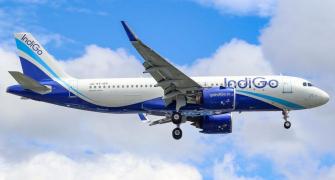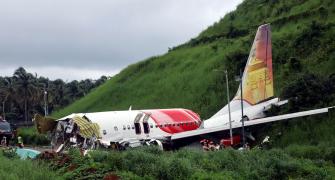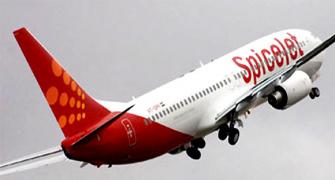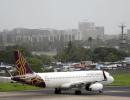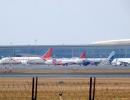A serious aviation disaster was averted at the Mumbai airport as an Air India plane took off while an IndiGo aircraft landed on the same runway within a minute.

The incident on Saturday morning is being investigated by aviation watchdog Directorate General of Civil Aviation, as well as IndiGo and Air India.
The two A320 aircraft together had around 300 passengers on board, sources said.
At the airport, the IndiGo flight landed on the same runway 27 from which an Air India flight was taking off, almost simultaneously.
In their statements, IndiGo and Air India said they were cleared for landing and take-off, respectively, by the Air Traffic Control (ATC).
"On June 8, IndiGo flight 6E 6053 from Indore was given landing clearance by ATC at Mumbai Airport. The pilot in command continued the approach and landing and followed ATC instructions," IndiGo said in a statement.
"At IndiGo, passenger safety is paramount to us, and we have reported the incident as per procedure," it said.
Air India, said its aircraft was cleared by the ATC to enter the runway and subsequently cleared for take-off.
The watchdog has derostered the Air Traffic Controller (ATC) who was on duty at the time of the incident on Saturday, while IndiGo has initiated a probe into the matter, officials added.
A purported video of one plane landing and another taking off from the same runway has been shared on social media.
"We are conducting a probe and have already de-rostered the ATCO involved in the incident," the DGCA official said.
Mumbai airport is a single-runway operation with two crossing runways' 09/27 and 14/32 that handles over 850 flights per day.
On a single runway RW27 at the Mumbai airport, there are around 46 arrivals and departures per hour.
Air Traffic Controllers' (ATC) Guild in a statement said there was "no air prox" situation in the incident. It also alleged that the ATCs are under "significant pressure" when there is high density traffic at the airport.
According to an Airports Authority of India (AAI) source, as a rule, departing aircraft have to cross the end of the runway or take a turn, only after which the ATC can issue the landing clearance for arriving aircraft.
"However, in this case, this was allegedly not followed," the source said.
"Air India flightAI657 from Mumbai to Trivandrum was on take-off roll on June 8. The Air India aircraft was cleared by Air Traffic Control to enter the runway and subsequently cleared for take-off," Air India said in the statement.
The airline also said its aircraft continued with the take-off roll in accordance with laid down procedures.
"An investigation has been initiated by the authorities to find out more on the clearance given to the airlines. Air India always accords top priority to the safety of its passengers and crew," the Tata Group airline said in the statement.
The Adani Group-AAI promoted Mumbai's Chhatrapati Shivaji Maharaj International Airport had earlier this year announced it will handle 8 per cent more air traffic movement at 6,657 ATMs per week (951 per day) during the summer schedule, which started from March 29, against the year-ago period.
"In this particular case... the visibility was good and there was no air prox situation with respect to the landing IndiGo flight and the taking off Air India flight," the Guild stated.
"The tower controller is allowed to reduce separation minima between two aircraft if reasonable assurance has been established by visualising both aircraft," as per ATC Guild.
According to the Guild, Mumbai airport is one of the high-density airports, which means that the number of flight movements is high.
"On a single runway RW27 at the airport, there are around 46 arrivals and departures per hour," it said.
Had there been a safety risk, the pilot himself would have initiated a go around, the ATC Guild said.
ATCs are allowed to clear up to two arrivals and two departures within three minutes as per standard operating procedures, subject to certain conditions.
The separation minima between two aircraft can be reduced if the visibility is good, it said.
"ATCs are under significant pressure when there is high density traffic at airports with the safety of aircraft and passengers.
The DGCA probe will be looking at whether all norms were followed by the ATC as well as the pilots concerned," the Guild stated.
"In the video it can be seen that departure has crossed V2 speed -- at which the aircraft may safely climb with one engine inoperative and nosed up and on the other end of runway arrival is touching down," according to the Guild.

